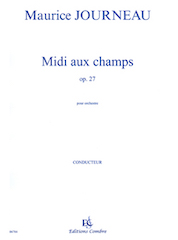
Midi aux Champs (Pastorale)

Instruments: (6) First violins - (6) Second violins - (4) Violas - (4) Cellos - (3) Double-basses (1) Harp (2) Flutes (piccolo by a second flute) - (2) oboes - (2) bassoons - (2) Clarinets in A - (2) Horns in F - (2) C trumpets - Timpani, cymbals, bass drum.
A work without great technical difficulties. But requiring many colours, the conductor of the orchestra acting a little like a painter. For this 20th century Pastoral is a glowing, bucolic picture, sunny and very cheerful.
Maurice Journeau is a French composer from the Basque country. He had the privilege of a very long life (b.17 November 1898 - d.9 June 1999). This enabled him to write continuously from 1921 to 1984, when he decided his task was over. This is the reason why his music, very near at first to Maurice Ravel's omnipresent one in the Basque country, will voluntarily undergo regular changes - even by the use of serialism techniques in the fifties - and then an evolution towards what he rather properly considered as a "moderately modern" style. "Midi aux champs" op.27, a Pastoral composed in July 1943, belongs to the Paris artistically mature period of the composer. So it comes much after the Biarritz time of his youth (1898-1926) and follows the period of Nice (1926-1936) characterized by a special interest in violin and other stringed instruments. Some explanations, so as to understand the orchestra work better... First, it is an orchestra version, a work written by the author himself even if not initially inspired to him by orchestra. This is quite typical of Journeau's musical process when he is very fond of one of his works for piano (his own favourite instrument) just like here, or for violin. Moreover, according to him, his Pastoral is one of his only two works " for the occasion" describing in music a definite landscape (the other one being "Sur l'Etang" op.18/1 for piano, c.1929). In fact, a country landscape in Normandy, a French region where the composer's family spent a very hot Summer in a house called "Les champs" (The Fields), because surrounded by wide corn-fields. Among Journeau's musical works, this 1943 Pastoral comes thus several years before his serial period when he is to adopt a new compositional technique during a decade. And the author's choice of writing this orchestra version already announces his later interest in composing directly for orchestra, but this time some symphonic works requiring very high-level musicians. The composer's love for nature - a newly fashionable contemporary theme - expressed by glowing sonorities may be particularly enjoyed by the public on beautiful Summer days. (Chantal Virlet-Journeau)
